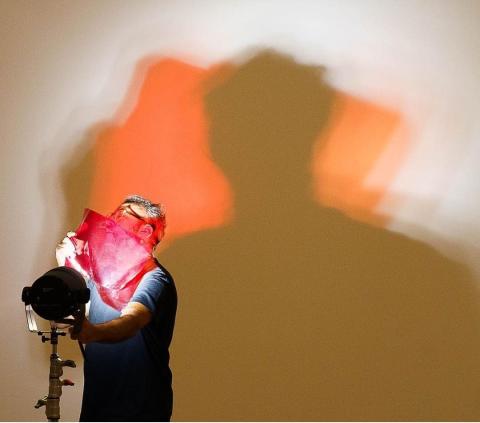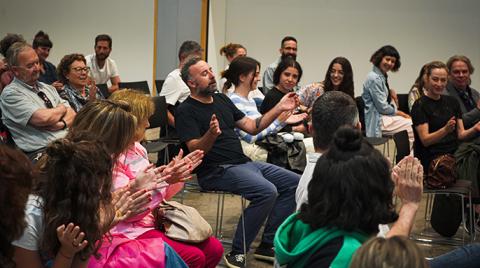Press Release: Marc Vives presents his performance La fiesta, created especially for the city of Arévalo, Spain

Marc Vives presents his performance La fiesta, created especially for the city of Arévalo, Spain
• La fiesta is one of the six site-specific works commissioned for the exhibition ¡Doblad mis amores! curated by Chus Martínez for Collegium
• It will be carried out on July 7 with local partners, as part of the San Victorino local festivities program
• Experiencing the city through sound and body, recovering Arévalo's festive traditions, is the axis of this performance conceived for this specific context
La fiesta, performance by Marc Vives
July 7, from 7 PM to 9 PM
Walk from Plaza de Fray Juan Gil to the Jesuit School, Arévalo, Spain
> Download press dossier of the exhibition (in Spanish)
> Download images
Arévalo, June 27, 2023.- On July 7, the exhibition ¡Doblad mis amores! at Collegium will be completed with the sixth of the works commissioned for this project: the performance La Fiesta by Marc Vives. This action has been conceived through visits, conversations, and workshops with people from Arévalo, aiming to rescue some local festive traditions while allowing participants to experience the city through sound and corporeality.
During this month of June, La fiesta has been presented at MUSAC in León and CGAC in Santiago de Compostela, although in a totally different format. In Arévalo, unlike the previous ones, the performance is conceived as a celebration built among all the participants and seeks to link in a specific way with the festivities of San Victorino and the historical-cultural context of the place.
Development of La fiesta:The event begins with a meeting in the Fray Juan Gil square: people start arriving, the group grows and fills up with inhabitants of Arévalo and its surroundings. Someone starts the call with a shout, melody, and rhythm, and the rest of us follow. The voice and the vibration travel from side to side, evoking the memory of every corner of the city.
During the walk, links are established between architecture, history, people, and desires through voice, song, percussion, and bodies. The contagion is the central element of any jaleo and synchronizes the excitement with the songs and dances. The rubbing appears and then the embrace.
In the old Jesuit school, the merriment and the hullabaloo reach their zenith: layers of the past are added to our present (as an educational center but also as a meeting and festive place), to charge the space towards the future. This phase involves an invasion of space through sound, emphasizing the presence of voices. At this point of the celebration, the articulation of the word has already been lost, and it becomes an explosion of paralanguage: noise, voices, and gestures, lead us to an emotional release, generating a union between all attendees and participants.
 La fiesta at MUSAC, León, Rodeo cycle, 2023. Photo: Jonathan Notario
La fiesta at MUSAC, León, Rodeo cycle, 2023. Photo: Jonathan Notario
• La fiesta is one of the six site-specific works commissioned for the exhibition ¡Doblad mis amores! curated by Chus Martínez for Collegium
• It will be carried out on July 7 with local partners, as part of the San Victorino local festivities program
• Experiencing the city through sound and body, recovering Arévalo's festive traditions, is the axis of this performance conceived for this specific context
La fiesta, performance by Marc Vives
July 7, from 7 PM to 9 PM
Walk from Plaza de Fray Juan Gil to the Jesuit School, Arévalo, Spain
> Download press dossier of the exhibition (in Spanish)
> Download images
Arévalo, June 27, 2023.- On July 7, the exhibition ¡Doblad mis amores! at Collegium will be completed with the sixth of the works commissioned for this project: the performance La Fiesta by Marc Vives. This action has been conceived through visits, conversations, and workshops with people from Arévalo, aiming to rescue some local festive traditions while allowing participants to experience the city through sound and corporeality.
During this month of June, La fiesta has been presented at MUSAC in León and CGAC in Santiago de Compostela, although in a totally different format. In Arévalo, unlike the previous ones, the performance is conceived as a celebration built among all the participants and seeks to link in a specific way with the festivities of San Victorino and the historical-cultural context of the place.
Development of La fiesta:The event begins with a meeting in the Fray Juan Gil square: people start arriving, the group grows and fills up with inhabitants of Arévalo and its surroundings. Someone starts the call with a shout, melody, and rhythm, and the rest of us follow. The voice and the vibration travel from side to side, evoking the memory of every corner of the city.
During the walk, links are established between architecture, history, people, and desires through voice, song, percussion, and bodies. The contagion is the central element of any jaleo and synchronizes the excitement with the songs and dances. The rubbing appears and then the embrace.
In the old Jesuit school, the merriment and the hullabaloo reach their zenith: layers of the past are added to our present (as an educational center but also as a meeting and festive place), to charge the space towards the future. This phase involves an invasion of space through sound, emphasizing the presence of voices. At this point of the celebration, the articulation of the word has already been lost, and it becomes an explosion of paralanguage: noise, voices, and gestures, lead us to an emotional release, generating a union between all attendees and participants.

About Marc Vives:
Marc Vives (Barcelona, 1978) is an artist, researcher, teacher, and producer on a rotating and/or simultaneous basis. In his practice, he basically sings and swims, lately in the Costa Brava, a routine with which he tries to find clues as to why he does what he does. He moves between visual arts and live arts. He undertakes this work from different learning strategies individually and collectively collaborating with other artists, forming research groups such as Si CentroCentro fuera FueraFuera, lxsquecorrenporahí in Massana, Moure parets in EINA or the cycle SECUENCIA with Fernando Gandasegui. Since 2013 he co-directs GRAF.cat, a platform for contemporary creation spaces in Catalonia. And since 2022 she is part of the curatorial team of La Capella. Between 2014 and 2017 he led the residency program of L'Estruch (Sabadell), he also initiated the projects TRACTORA, AZPI, YProductions, Hamaca or Por La Vena.
He has exhibited his work in Rogaland Kunstsenter (Stavanger, 2016), Redcat, (Los Angeles, 2016), etHALL (Barcelona, 2018), MACBA (Barcelona 2021) and has participated in contests such as Domingo, La Casa Encendida (Madrid, 2021); La cuestión es ir tirando, CCEMX (Mexico City, 2020), and Festival Grec (Barcelona, 2020). Between 2002 and 2012 he was part of the artistic duo Bestué-Vives.
About ¡Doblad mis amores!
The exhibition takes its title from a quote by the poet Ramón Llull, serving as a starting point from which six contemporary Spanish artists, through site-specific projects, reflect on the capacity of art to generate and multiply affections. The desire to connect with the land, generate links, and rescue knowledge, is a theme that takes on special relevance when approached from a rural context.
¡Doblad mis amores! encompasses six projects that have been designed for the church of San Martín and at the same time go beyond it since its objective and scope has to do with learning to relate to each other from vulnerability and, ultimately, as the title indicates, to duplicate affections.
The exhibition is curated by Chus Martínez and includes works by Teresa Solar, Álvaro Urbano, Belén Rodríguez, Pep Vidal, Regina de Miguel and Marc Vives.
About Collegium:
Collegium is a center for creation, research and exhibition of contemporary art. It is also a space for artist residencies, the promotion of craft practices and the conservation of art objects. Collegium's mission is to build community and build knowledge. Its strategic point of operations is located in the city of Arévalo, in the province of Ávila in the Autonomous Community of Castilla y León.
Marc Vives (Barcelona, 1978) is an artist, researcher, teacher, and producer on a rotating and/or simultaneous basis. In his practice, he basically sings and swims, lately in the Costa Brava, a routine with which he tries to find clues as to why he does what he does. He moves between visual arts and live arts. He undertakes this work from different learning strategies individually and collectively collaborating with other artists, forming research groups such as Si CentroCentro fuera FueraFuera, lxsquecorrenporahí in Massana, Moure parets in EINA or the cycle SECUENCIA with Fernando Gandasegui. Since 2013 he co-directs GRAF.cat, a platform for contemporary creation spaces in Catalonia. And since 2022 she is part of the curatorial team of La Capella. Between 2014 and 2017 he led the residency program of L'Estruch (Sabadell), he also initiated the projects TRACTORA, AZPI, YProductions, Hamaca or Por La Vena.
He has exhibited his work in Rogaland Kunstsenter (Stavanger, 2016), Redcat, (Los Angeles, 2016), etHALL (Barcelona, 2018), MACBA (Barcelona 2021) and has participated in contests such as Domingo, La Casa Encendida (Madrid, 2021); La cuestión es ir tirando, CCEMX (Mexico City, 2020), and Festival Grec (Barcelona, 2020). Between 2002 and 2012 he was part of the artistic duo Bestué-Vives.
About ¡Doblad mis amores!
The exhibition takes its title from a quote by the poet Ramón Llull, serving as a starting point from which six contemporary Spanish artists, through site-specific projects, reflect on the capacity of art to generate and multiply affections. The desire to connect with the land, generate links, and rescue knowledge, is a theme that takes on special relevance when approached from a rural context.
¡Doblad mis amores! encompasses six projects that have been designed for the church of San Martín and at the same time go beyond it since its objective and scope has to do with learning to relate to each other from vulnerability and, ultimately, as the title indicates, to duplicate affections.
The exhibition is curated by Chus Martínez and includes works by Teresa Solar, Álvaro Urbano, Belén Rodríguez, Pep Vidal, Regina de Miguel and Marc Vives.
About Collegium:
Collegium is a center for creation, research and exhibition of contemporary art. It is also a space for artist residencies, the promotion of craft practices and the conservation of art objects. Collegium's mission is to build community and build knowledge. Its strategic point of operations is located in the city of Arévalo, in the province of Ávila in the Autonomous Community of Castilla y León.
Exhibition Views
Collegium uses cookies to offer the best possible website experience. They are used to ensure the operation of the site or to collect anonymous statistics. Please select the categories you want to allow. Further information can be found in our data protection information.